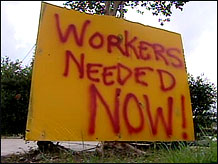|
|
|
|

|
| Business owners may have to offer higher pay and temporary housing to attract workers. Jason Carroll reports (October 3) |
Play video
|
|
|
|
|
|
|
|
NEW YORK (CNN/Money) -
This Friday's monthly employment report is probably going to be pretty scary -- it's predicted to show that September saw the first decline in U.S. payrolls since May 2003.
But smart investors won't overreact to the number, which will be affected not only by Hurricane Katrina's impact on the labor market, but by the Labor Department's ability to collect data through surveys in the affected Gulf Coast region.
"I think it's fair to say it'll be the least important or most distorted jobs report in memory," said Anthony Chan, senior economist with JPMorgan Asset Management. "Maybe both."
Because of questions about the surveys that are used by the Labor Department's Bureau of Labor Statistics (BLS) to compile the report, economists' forecasts vary widely.
Economists surveyed by Briefing.com expect a loss of 150,000 jobs to be reported, while Reuters' survey comes up with a consensus of a 129,000-job loss, with a range of estimates that stretch from Lehman's projection of a 400,000 decline to Citigroup's prediction of only a 25,000 decline.
The consensus forecast from both Briefing and Reuters for the unemployment rate is for it to rise to 5.1 percent from August's 4.9 percent, before Katrina hit. But again the range of forecasts is much wider than normal, stretching from 4.9 to 5.3 percent.
"We're basically guessing how the BLS adjusts for Katrina, which is an even bigger stretch than we normally have to do," said Gina Martin, an economist with Wachovia Securities.
The Bureau of Labor Statistics will adjust the way it compiles the report to try to adjust for those displaced by the storm. But it will not come up with an estimate of how many people lost their jobs due to the storm, said BLS analyst Bill Goodman.
"We can't quantify the effect, even the direct effect. We can't give even a rough estimate," he said.
The Congressional Budget Office has estimated that the storm cost 400,000 jobs, at least temporarily.
But despite the problems with the numbers, some believe that markets will react after the 8:30 a.m. ET report.
"Economists all realize this number is not a big deal, but people will be trading on the number this week whether it's a big deal or not," said Martin.
Overall economy shows strength
Given the expected impact of Katrina on the payroll number, the economists' forecasts suggest that they see underlying strength in the national labor market close to pre-storm levels. The employer survey had found an average of 194,000 jobs added during each of the first 8 months of the year before the storm.
Economists say that even with the devastation on the Gulf Coast, that job loss will start to work itself out sooner rather than later.
"These jobs are not lost forever," said Chan. "When you take into account everything coming through the pipeline, all Federal aid, all the insurance money, there will be a lot of jobs created by recovery efforts. Remember the GDP of New Orleans was about $40 billion annually before the storm. We'll easily see more than that being pumped into the system."
Still Katrina is enough to cause severe data collection problems.
Part of the problem is that if an employer is called by the Labor Department and it doesn't answer, the department will conclude it is at least temporarily closed and without employees, even if its workers are all still on the job at remote locations. That means that the job losses could be overstated by the employer survey.
Meanwhile, people who had to leave their homes in the Gulf Coast due to storm damage may end up being counted as no longer in the labor force. The lower number of people included in the labor force could mean the unemployment rate may register lower than it really is, according to economists.
One thing that won't affect this report is Hurricane Rita. The data was collected and surveys conducted a full week before evacuations from the Houston and Texas Gulf Coast began due to the threat posed by that storm.
Still all the problems with this month's report is leaving economists scratching their heads as they prepare to weigh the data.
"I think Friday's number will be impossible to analyze," said economist Greg Valliere of the Stanford Washington Research Group. "But everyone said all the numbers this week would be ignored, and the ISM number caused a big sell-off in the bond market." The ISM, which came out on Monday, is a survey of manufacturing executives about their business conditions. This month's report showed strong orders and manufacturing activity but also a big jump in prices paid for raw materials and other goods by the businesses.
Valliere said that even if investors overreact to the jobs report, he can't believe that anything in report will move the Federal Reserve off its path of "measured" quarter-percentage point rate hikes.
"I think the number is going to be so unreliable, so fluky, I don't see this number by itself changing the scenario for the Fed," he said.
For more on the impact of Hurricane Katrina on jobs, click here.

|